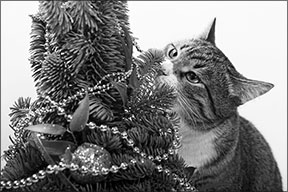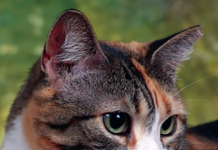As then-veterinary student Pamela J. Perry, DVM, Ph.D., was packing her car to head home for the holidays, her cat Chester began vomiting wads of tinsel. When she called the veterinary college to have Chester examined, her roommate mentioned that she had seen Chester pulling strands of tinsel from the tree and eating them — she even took photographs.

288
Dr. Perry rushed Chester to the veterinary hospital for abdominal X-rays. “Fortunately, he had already vomited the majority of the tinsel and did not require surgery,” she says, and Chester recovered uneventfully.
Dr. Perry, a lecturer in animal behavior at the Cornell University College of Veterinary Medicine, never again decorated a tree with tinsel and still displays the pictures of Chester eating it as a reminder of the trouble cats can get into during the holidays.
Who doesn’t have a memory of the cat climbing the Christmas tree or singeing his tail in a candle flame? Dangling ornaments, packages tied with ribbons, beautiful but toxic plants and hordes of guests trooping in and out can all tempt your tabby into trouble, but these expert tips can help you both survive the holidays intact:
Supervise guests and cats. Don’t let guests slip Snowball any foods he shouldn’t have, and don’t give him the opportunity to snag the string used to wrap the turkey or ham. String, tinsel and ribbons — known to veterinarians as potential linear foreign bodies — are favorite feline playthings, but if swallowed, can cause serious partial or complete intestinal obstructions and injuries like perforations requiring emergency surgery, Dr. Perry says.
Practice safe scents. Essential oils can be highly toxic, says Gretchen L. Schoeffler, DVM, DACVECC, Emergency and Critical Care Section Chief at the Cornell University College of Veterinary Medicine. Cats seem to be drawn to them, but even eating potpourri, which has less concentrated oils, can cause severe internal injuries in the form of burns to the mouth and esophagus.
While burning candles may smell inviting, Dr. Schoeffler says they can cause burns from hot wax if knocked over by a curious cat or even start a house fire. Instead, simmer natural ingredients on the stove to spread a holiday aroma throughout your home. Good combinations include pine or cedar twigs, bay leaves and nutmeg, or cinnamon, cloves and orange peel.
Hide the chocolate. Eating it can lead to vomiting, diarrhea and more serious reactions, depending on the type and amount ingested. Dark baker’s chocolate is more toxic than milk chocolate, which is adulterated with sugar and other ingredients.
Place holiday greenery out of reach. At best, cats eat it and then throw it up, usually in the middle of your cookie exchange party. At worst, plants such as mistletoe, holly and amaryllis can cause mild to severe vomiting, diarrhea, abdominal discomfort, difficulty breathing, kidney failure and even death if a cat eats them. Lilies are particularly toxic to cats if they eat even a small amount of the plant or flower, Dr. Perry says.
Truss the tree. To protect it from climbers, anchor the tree to the ceiling or wall with bungee cords. Wait several days to decorate it so your cat becomes used to it, then use nontoxic, unbreakable ornaments. Prevent electrical burns to the mouth by wrapping electrical cords in tough cable covers. And read the label before adding chemical extenders to the water for live trees. They may be toxic to animals who check out the new “water bowl.” Play it safe by blocking access to the water.
All is calm, all is bright. While many cats enjoy the hustle and bustle of holidays, others could do without the disruption of their routine and the presence of strangers. Even if they don’t have to battle crowds at malls or turn out a perfect roast for 20, the holidays can be just as stressful — if not more so — for pets as for people, Dr. Perry says.
To reduce stress, maintain as much of your cat’s normal routine as possible. A quiet room where he can escape from the commotion is ideal. Taking time to provide daily one-on-one time will also help smooth your cat’s ruffled fur and likely lower your blood pressure as well.
What about those cute jingle-bell collars? Could they harm your cat? Unless he chews off and swallows the bells, only his pride will be hurt, but you might want to watch your back in case he has a vengeful nature. ❖



